WHEN THE SUN MARRIES THE MOON
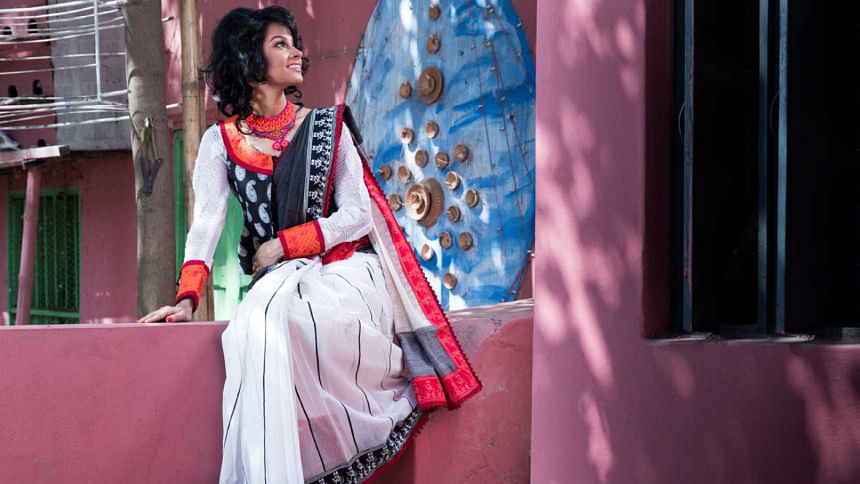
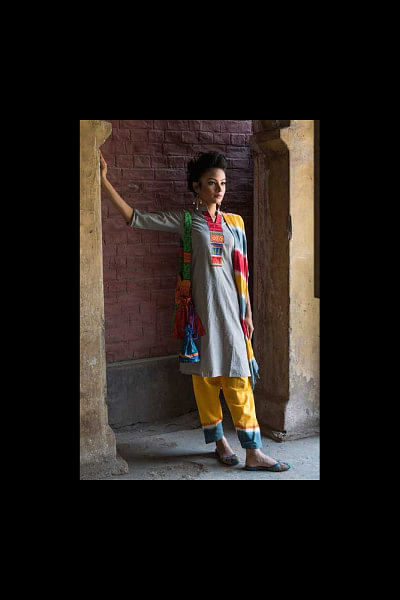
A resident of Dhanmondi, Neaz finds it easier to start the New Year there at Rabindro Shorobar, a location close to his house which now draws near capacity crowds on the festive day. There, he will wait for the singers in the open arena and then go off to perhaps get a paisley painted on his cheek or maybe even indulge in the delicious paanta bhaat and ilish, a concoction of left over rice soaked in water, served with a chilly and a delicious helping of fried hilsha.
If he is a client of a major bank or telecommunication firm, he may even avail a sweet discount on his meal. From there, it's off to Dhaka's latest fancy eatery for a quick bite or perhaps even a meet-up with friends at The Westin, one of the capital city's fanciest hotels. After partying with friends, Neaz may just be home in time for dinner with his family.
Next to Neaz's room, his mother, Husna Rahman, has significantly different plans. At the moment, she is busy preparing the first meal of the day: homemade 'paanta bhaat'. While she knows her son is up, she is in no hurry. "He doesn't eat with us these days. This is one of his few days off, so he spends it with friends," she says without a trace of sadness, resigned to the fate of ever changing times.
Her husband will be up in an hour though to eat with her and as a special treat he will take her out to relive the good old days. Their first stop will be Ramna Batamul, one of the most happening spots during this time. Although she will miss the initial round of singing under the customary batamul, she knows she'll catch the rest of the show.

In between her meal preparation, Husna reaches for her phone to ask her sister when she is coming. After hearing the response, she hangs up and goes to her fridge. From there, she brings out a generously sized hilsha fish. She proceeds to take a picture of it and uploads it to her Facebook. Then, she logs on to Youtube and starts to stream "Esho hae Boishakh", Pohela Boishakh's most-loved anthem.
After Ramna Park, she plans on buying some flowers and sweets and coming back home, where a few of her relatives and friends are due. By then, her husband would have gone to work, only to return to pick her up for dinner, which they will be having at her mother's house.
Mustafizur Rahman, Husna's husband, is a 58-year old businessman. His business is located at Shakhari Bazaar, where he sells spare parts for a living. One of the old breed, Mustafizur comes from a family of businessmen, dealing with almost the same thing and having worked in the same office for generations.
He is of course old-school. He begins the day like any other, grabbing the latest issue of the newspaper and waiting for his cup of tea. Afterwards, he will try some of the 'paanta bhaat' but save his appetite for when he gets to Ramna Park, for the celebrations. But before leaving, he will call his office to make sure his accountant has reached.
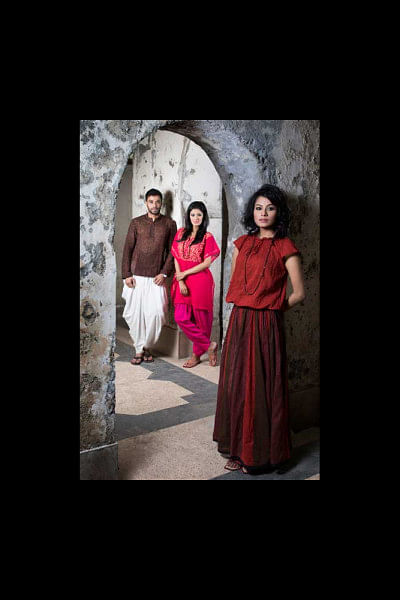
Mustafizur is still groggy, fatigued from last night's work, when he had to finally clear all his dues and close all of last year's accounts. Today, he will have to open a new financial records book, called a haal khata, despite it being a holiday. He hopes to be done before the afternoon, so he can return and have lunch with the family, before going on with the rest of his day. He doesn't have a brand new panjabi, but he did not forget to get his wife a new sari. He'll have to take a picture with her in that sari and post it on his Facebook.
The Rahmans are indeed a typical Bengali family. They all believe themselves to have a set of duties, which they go through diligently. However, their understanding of the New Year, differs vastly on the surface; it is either an opportunity to mingle with friends, begin your work anew or have a session involving most members of the family. Basically, they all wish to socialise, which is the very essence of the New Year.
Reams have been wasted explaining the origins, history and customs of Pohela Boishakh. Now, people spend time wondering whether the current generation have become far removed from their culture. The flowers in the hair have changed to new hairdos and hotels have replaced parks and open spaces, with most having a better chance of hearing Pitbull than Tagore. If the case study illustrates anything, then it is just that, how modernity is encroaching on tradition.
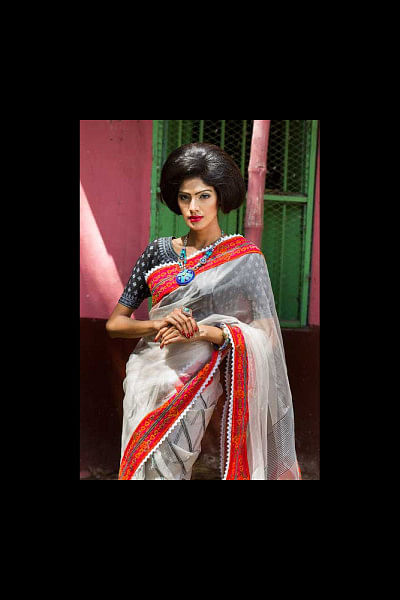
However, as scandalous as the thought may be, the notion of changing times is not such as a bad thing. While Neazur makes it a point to wish his friends on Facebook, he won't miss the chance of wishing his parents in person first. While he may not go to have paanta bhaat, he still will not pass up the chance to celebrate his culture. In fact, it could be argued that with the passage of time, we are returning closer to the essence of Pohela Boishakh, the true spirit of it which perhaps time has eroded. Indeed, nowadays, Pohela Boishakh, like most festivals, isn't restricted to Bengalis. It is a celebration for all cultures, all religions and all races. In fact, Pohela Boishakh goes to great lengths to retain the simplicity of celebrations. All the day demands are colourful clothes, not brand new ones. Similarly, the food to be served used to be the simplest available in Bengal. Pohela Boishakh was never a flashy event. True, nowadays it has become flashier, but in its essence it remains the same; a reunifying reference point for all who see it for what it really is.

THE PHOTOSHOOT WAS CONDUCTED UNDER
PHOTO: SAZZAD IBNE SAYED
MAKEUP & HAIRSTYLE:
FARZANA SHAKIL
STYLING: AZRA MAHMOOD
SPECIAL THANKS TO KOLORS OF KATHMANDU
(www.facebook.com/
KolorsOfKathmandu)
***
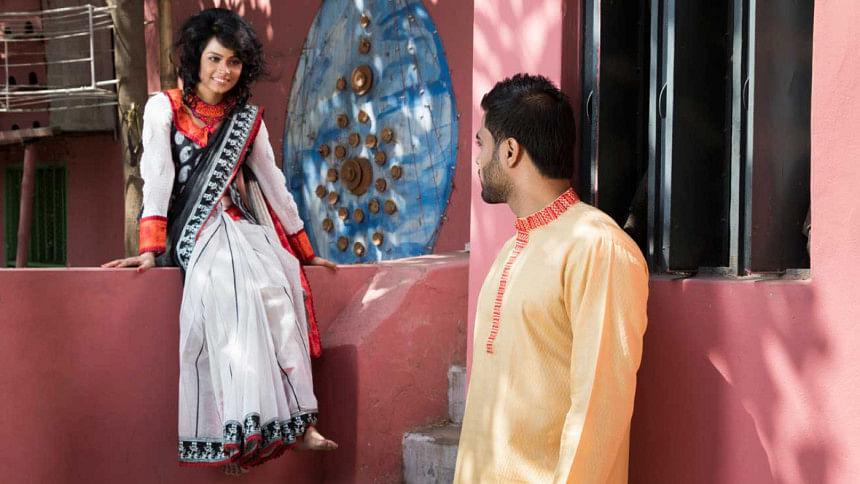
A Boishakhi Morning
Neazur Rahman, a 27-year old chartered accountant, prepares to welcome the Bengali New Year, Pohela Boishakh, in the same way he has for years. Waking up just before the break of dawn, Neaz puts on a brand new panjabi, sporting white and red colours.

 For all latest news, follow The Daily Star's Google News channel.
For all latest news, follow The Daily Star's Google News channel. 


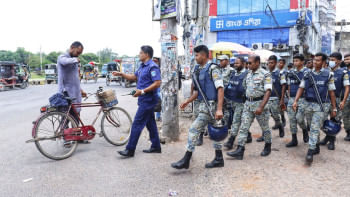
Comments